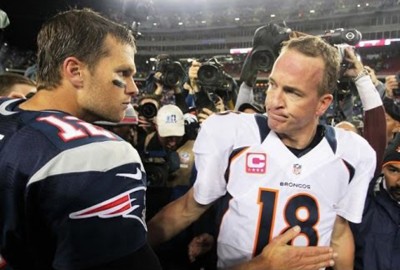
In 2001, then-Patriots quarterback Drew Bledsoe took a hard hit from New York Jets linebacker Mo Lewis. The hit caused Bledsoe to suffer from internal bleeding and thrust Tom Brady into his first regular season game. One week later, Brady made his first start against the Indianapolis Colts, as led by Peyton Manning. Football would never be the same again.
That cold Sunday in Foxborough was the beginning of the greatest two-man rivalry we’ve seen since the likes of Muhammad Ali and Joe Frazier. Since that day, Brady and Manning have met 16 more times, most likely concluding with Sunday’s AFC Championship Game. While the overall record favors Brady at 11-6, Manning holds the slight edge in postseason matchups at 3-2. But one does not learn the importance of the rivalry by simply looking at numbers. Instead, we must dig deeper to see the impact that these two greats, and their rivalry, have left on the game.
When he first entered the league, Tom Brady was the 199th overall pick and was buried in the depth chart for New England going into his rookie campaign. Conversely, Manning was a first overall selection out of The University of Tennessee and was destined to be the NFL’s golden boy. Both exceeded expectations.
Manning has become one of the best, if not the best, regular season passer in the history of the game. His 539 career touchdowns are an NFL record, as are the numerous other accolades that would reach the floor if compiled in an ordered list.
Brady’s 22 postseason wins as a starting quarterback are the most of all time, and he is tied with Joe Montana and Terry Bradshaw for the most Super Bowl victories at the position with four.
The two are in the conversation for the best quarterback of all time and have both transformed the game in unimaginable ways. When Peyton Manning was drafted in 1998, the league was dominated by running backs. Similarly, the NFL during Brady’s rookie campaign was governed by the likes of Hall of Fame rushers Marshall Faulk, Jerome Bettis and Emmitt Smith. Now, as Manning will most likely depart the league after appearing in his fourth Super Bowl, the quarterback rules professional football. It is because of this trend set by the two illustrious passers that there have been 12 quarterbacks selected with the first overall pick since Manning’s draft day in 1998.
Brady himself has been the embodiment of quarterback importance, as his Patriots have always been able to make deep post-season runs with him at the helm, even with no-name wide receivers and a revolving door of players at running back. Manning, similarly, exemplified his importance in 2011 when his season-ending neck injury caused the formerly 10-6 Colts to drop to 2-14.
As both quarterbacks play in the twilight of their careers — though Manning’s seems to be closer to its end than Brady’s — both are still proving their worth while defying the crippling effects of age on an NFL quarterback. Brady, for the first 10 games of the season, was in the conversation for league MVP and managed to lead the league in touchdowns with 36. Although Manning has significantly declined in the past two seasons, he is coming off of a stellar performance in an AFC Championship Game in which he threw for 176 yards and two touchdown passes.
Their classic matchups have boosted football to unimaginable popularity heights. While the NFL needs no help in drumming up ratings for its regular season and playoffs, the Brady-Manning clashes always appear on primetime and draw massive numbers. Sunday’s installment of the rivalry averaged 53.3 million viewers for CBS, the largest turnout since 2011. Under these bright lights and focused eyes stand two titans of the sport who always seem to deliver.
Their most dramatic games have often come with severe postseason implications. In the 2007 AFC Championship Game, the Brady-led Patriots took a 21-3 lead going into the half before Manning orchestrated a comeback. Five meetings later, in 2013, it was New England playing as the comeback kids, as they dramatically overcame a 24-0 deficit at halftime to win 34-31 in overtime.
Sunday’s matchup was another instant classic in a rivalry that has changed the way football is played on the professional level. Though highly dominated by defense, the game came down to Brady trying to force overtime. In vintage “TB12” fashion, the former Michigan Wolverine came up clutch and found Rob Gronkowski in the end zone. The failed two-point conversion was the storyline following the completion of the game, but what cannot be overlooked is the poise and grace that both legends played with throughout the game.
There’s no two ways about it — these two men have transcended their sport. All throughout homes in Boston, Denver and Indianapolis, you can find children with Brady or Manning jerseys hanging on their wall. The pair’s competitiveness, sportsmanship and greatness continue to revolutionize the sport, while leaving a sense of inspiration and awe in all of those who had the privilege of seeing these two gods of football battle one another.










































































































